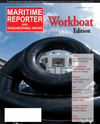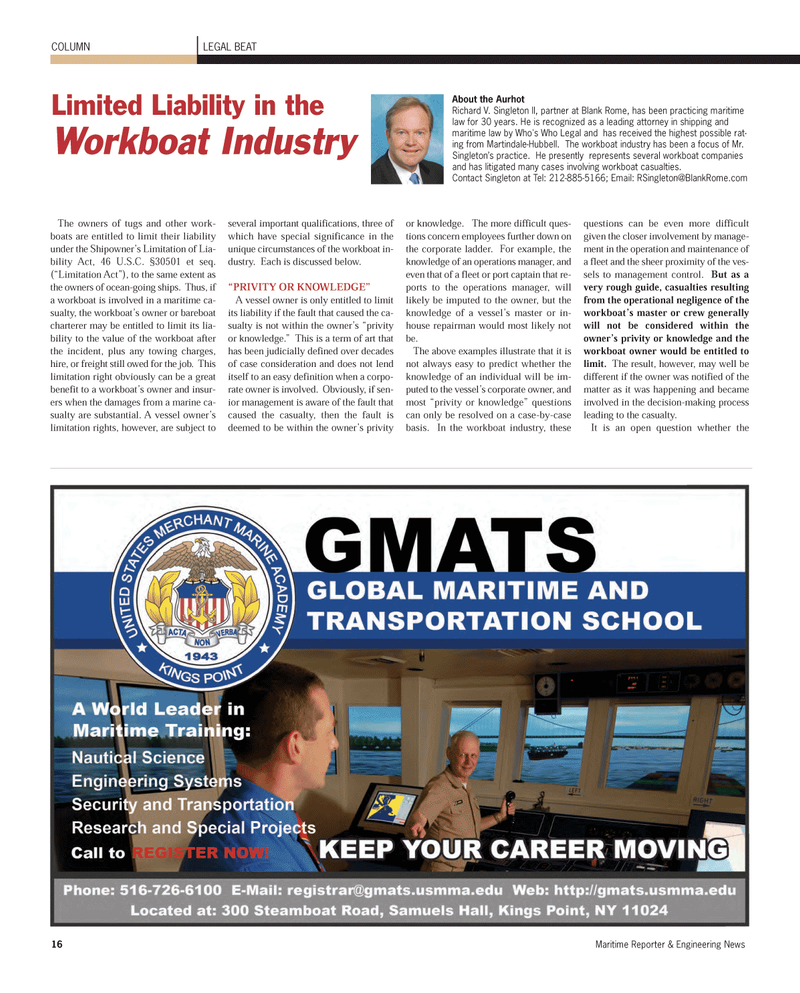
Page 16: of Maritime Reporter Magazine (November 2011)
Feature: Workboat Annual
Read this page in Pdf, Flash or Html5 edition of November 2011 Maritime Reporter Magazine
16Maritime Reporter & Engineering News The owners of tugs and other work- boats are entitled to limit their liabilityunder the Shipowner?s Limitation of Lia- bility Act, 46 U.S.C. §30501 et seq. (?Limitation Act?), to the same extent as the owners of ocean-going ships. Thus, if a workboat is involved in a maritime ca- sualty, the workboat?s owner or bareboat charterer may be entitled to limit its lia-bility to the value of the workboat after the incident, plus any towing charges, hire, or freight still owed for the job. This limitation right obviously can be a great benefit to a workboat?s owner and insur- ers when the damages from a marine ca-sualty are substantial. A vessel owner?s limitation rights, however, are subject to several important qualifications, three of which have special significance in the unique circumstances of the workboat in- dustry. Each is discussed below. ?PRIVITY OR KNOWLEDGE? A vessel owner is only entitled to limit its liability if the fault that caused the ca-sualty is not within the owner?s ?privity or knowledge.? This is a term of art that has been judicially defined over decades of case consideration and does not lenditself to an easy definition when a corpo- rate owner is involved. Obviously, if sen- ior management is aware of the fault that caused the casualty, then the fault is deemed to be within the owner?s privity or knowledge. The more difficult ques- tions concern employees further down on the corporate ladder. For example, the knowledge of an operations manager, and even that of a fleet or port captain that re- ports to the operations manager, will likely be imputed to the owner, but the knowledge of a vessel?s master or in- house repairman would most likely not be.The above examples illustrate that it is not always easy to predict whether the knowledge of an individual will be im- puted to the vessel?s corporate owner, and most ?privity or knowledge? questions can only be resolved on a case-by-case basis. In the workboat industry, these questions can be even more difficult given the closer involvement by manage- ment in the operation and maintenance ofa fleet and the sheer proximity of the ves- sels to management control. But as avery rough guide, casualties resulting from the operational negligence of the workboat?s master or crew generally will not be considered within the owner?s privity or knowledge and the workboat owner would be entitled to limit. The result, however, may well be different if the owner was notified of the matter as it was happening and became involved in the decision-making process leading to the casualty. It is an open question whether theLEGAL BEAT COLUMNLimited Liability in theWorkboat Industry About the AurhotRichard V. Singleton II, partner at Blank Rome, has been practicing maritime law for 30 years. He is recognized as a leading attorney in shipping and maritime law by Who's Who Legal and has received the highest possible rat- ing from Martindale-Hubbell. The workboat industry has been a focus of Mr. Singleton?s practice. He presently represents several workboat companies and has litigated many cases involving workboat casualties. Contact Singleton at Tel: 212-885-5166; Email: [email protected] MR Nov.11 # 2 (10-17):MR Template 10/31/2011 9:24 PM Page 16

 15
15

 17
17
